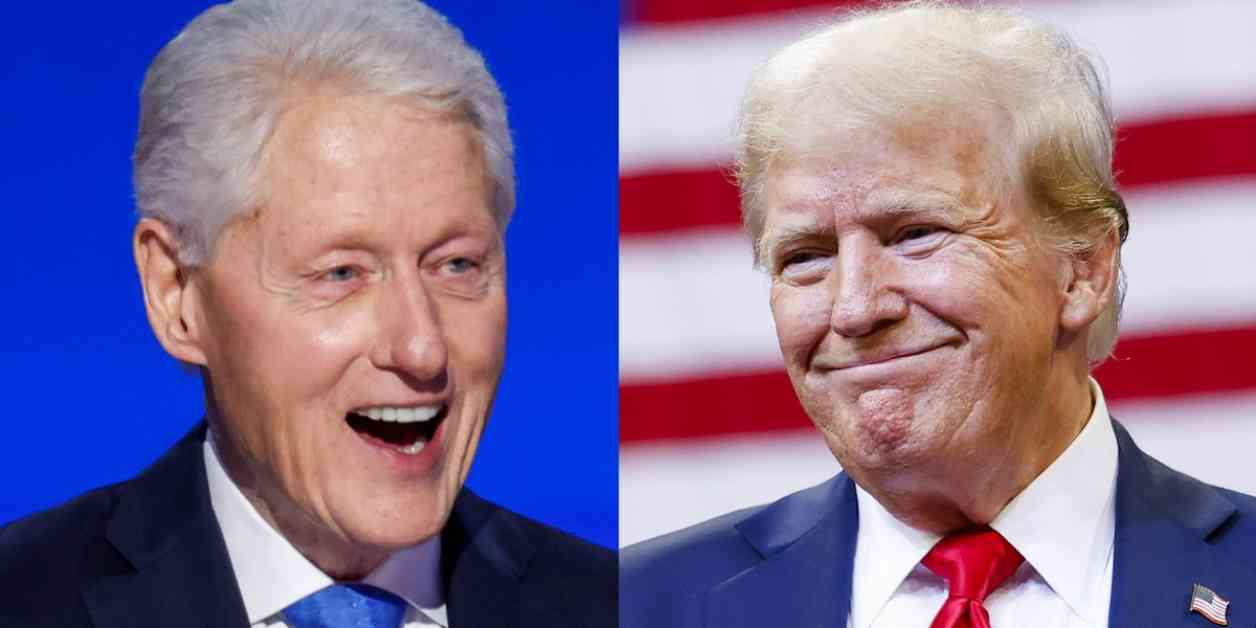Former President Bill Clinton took a jab at current President Donald Trump for his peculiar affinity for praising the fictional character Hannibal Lecter during the Democratic National Convention. In his speech, Clinton highlighted Trump’s odd habit of mentioning “the late, great Hannibal Lecter” in his public addresses, despite the fact that Lecter is a purely fictional villain from the mind of author Thomas Harris.
Trump’s references to Hannibal Lecter have raised eyebrows and sparked confusion among many, as the character is best known for his cannibalistic tendencies and chilling portrayal by actors such as Anthony Hopkins. Clinton humorously questioned the rationale behind Trump’s repeated tributes to a fictional character, suggesting that it sends a perplexing signal to other countries about the seriousness of his statements.
The former president quipped, “When you send a signal to other countries, you want them to know, whether they agree with you or not, at least that you’re on the level. What are they supposed to make of these endless tributes to the ‘late, great Hannibal Lecter’?” Clinton’s playful tone underscored the absurdity of Trump’s fixation on a character known for his gruesome crimes.
Despite the fictional nature of Hannibal Lecter, Trump has continued to incorporate references to him in his speeches, particularly when discussing immigration. During a recent address in Charlotte, North Carolina, Trump invoked Lecter as a metaphor for the perceived dangers posed by immigrants from various regions around the world.
“They’re coming not just from South America but from Africa, from Asia, from the Middle East,” Trump remarked. “They’re coming from everywhere. They’re coming from all over the world, from prisons and jails, mental institutions and insane asylums!” His choice to invoke the name of Hannibal Lecter in this context drew both confusion and criticism from observers.
Trump’s insistence on mentioning a fictional character like Hannibal Lecter in his public speeches has led to speculation about his motives and mental state. Some have questioned the appropriateness of using a notorious fictional villain to make points about real-world issues, while others have raised concerns about the implications of such references on diplomatic relations with other countries.
Understanding Trump’s Fascination with Hannibal Lecter
To comprehend Trump’s strange fixation on Hannibal Lecter, it is essential to consider the broader context of his rhetoric and communication style. Throughout his political career, Trump has employed provocative language and unconventional references to convey his messages to the public.
By invoking a character like Hannibal Lecter, known for his cunning intellect and dark persona, Trump may be attempting to underscore the perceived threats posed by certain groups or individuals in society. The use of a fictional villain allows Trump to tap into deep-seated fears and anxieties among his supporters, painting a vivid picture of danger and chaos that requires his strong leadership to address.
Additionally, Trump’s references to Hannibal Lecter may serve as a form of shock value or entertainment for his audience, as he seeks to maintain their attention and interest during his speeches. The use of a notorious character like Lecter can create a sense of drama and intrigue, drawing in listeners and generating buzz around his remarks.
However, the repeated mentions of Hannibal Lecter by Trump have also raised concerns about the line between reality and fiction in his public discourse. By blurring the boundaries between a fictional character and real-world issues like immigration, Trump risks undermining the credibility of his arguments and diminishing the seriousness of the topics he addresses.
Impact on Public Perception and Political Discourse
The use of fictional references like Hannibal Lecter in political speeches can have significant implications for public perception and political discourse. By incorporating characters from popular culture into his rhetoric, Trump may be attempting to connect with a broader audience and resonate with individuals who are familiar with these references.
However, the use of fictional characters in political discourse can also be seen as a distraction or a diversion from the real issues at hand. By focusing on sensationalist language and dramatic imagery, Trump may be detracting from substantive policy discussions and meaningful debates on pressing national issues.
Moreover, the repeated mentions of Hannibal Lecter by Trump have sparked debate about the appropriateness of using fictional villains in political communication. Critics argue that such references trivialize serious topics and undermine the gravity of the challenges facing the country, while supporters defend Trump’s use of provocative language as a means of engaging and energizing his base.
Ultimately, the impact of Trump’s fascination with Hannibal Lecter on public perception and political discourse remains a topic of debate and discussion. As the president continues to incorporate references to fictional characters in his speeches, it is essential for the public to critically evaluate the implications of such rhetoric on the national conversation and the future of political discourse in the United States.
Conclusion
In conclusion, Bill Clinton’s humorous critique of Donald Trump’s praise for Hannibal Lecter sheds light on the unconventional and provocative nature of Trump’s rhetoric. By invoking a fictional character known for his heinous crimes, Trump has sparked confusion and controversy, prompting questions about the appropriateness and implications of such references in political discourse.
As Trump continues to incorporate references to Hannibal Lecter in his public speeches, it is crucial for the public to consider the broader impact of such rhetoric on public perception and political discourse. By critically examining the motives behind Trump’s fascination with fictional villains, we can gain insight into the complexities of his communication style and the challenges of navigating the blurred lines between reality and fiction in contemporary politics.













